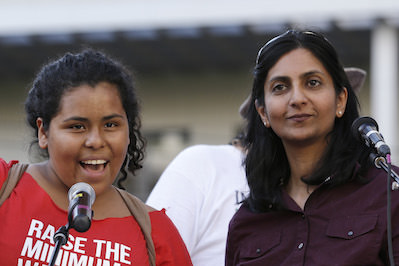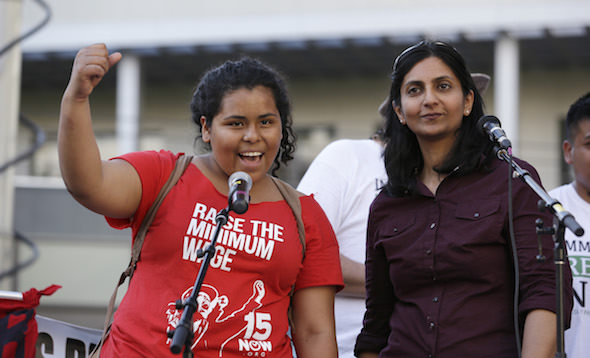Truthdigger of the Week: Seattle City Councilwoman Kshama Sawant
The socialist's achievements in office, including a minimum-wage hike to $15, and re-election this month are exposing as a sham the idea that the welfare of workers, especially the unskilled, is incompatible with a prosperous economy.

Seattle City Councilwoman Kshama Sawant, right, looks on as a translator speaks at a May Day rally this year in support of immigrant rights and a higher minimum wage. (Elaine Thompson / AP)
Every week the Truthdig editorial staff selects a Truthdigger of the Week, a group or person worthy of recognition for speaking truth to power, breaking the story or blowing the whistle. It is not a lifetime achievement award. Rather, we’re looking for newsmakers whose actions in a given week are worth celebrating.
Jeremy Corbyn in England. Justin Trudeau in Canada. Bernie Sanders in the U.S.
The recent spate of electoral successes (or in Sanders’ case, his popularity) across the English-speaking West of politicians spanning the left band of the political spectrum suggests that voters in these countries are open to experimenting with policies forged according to the values of tolerance, democracy and economic fairness. The re-election this month of Seattle socialist Kshama Sawant to her second term on the City Council by 56 percent of voters is clearly part of this trend.
Seattle is no bastion of socialist feeling. Over the past decade and a half, the share of the city’s industry controlled by technology companies has swelled. This change has not harmed the cause of social equality. As a class, tech professionals are reliably tolerant of lifestyle differences, and Seattle is not known for over-discrimination by gender or race. But these companies are hardly friends of working people. Seattle’s politicians have done little to blunt the sharp edges of gentrification, and the city’s undercompensated workforce has suffered the effects of rising rents, stagnant wages and the underfunding of essential services by a government keen to cut taxes on business in order to keep jobs involved in the production of software and jet engines in town.
As in every other major U.S. city, these were the policies of consensus — until Sawant was elected in 2013. Her victory took the city’s establishment by surprise. Elected on a promise to fight to increase the local minimum wage to $15 an hour, Sawant’s win marked the return of the working class to Seattle politics. And it wasn’t just bluster. In less than six months after she took office, the City Council passed the new minimum wage. At last, the premise purveyed for more than two decades by Clinton Democrats, that in the age of globalization, the welfare of workers — especially the unskilled — is incompatible with a prosperous economy, is being exposed as a sham.
Once the wage hike seemed inevitable, Seattle Mayor Ed Murray and other City Council members quickly claimed that it had been in the works all along. But this is not the case. The interest of workers was served here only by the steady organization of working voters and the arrival of a figure who was willing and able to lead them.
Sawant had other successes in office. Causes she championed included the blocking of a 400 percent rent hike proposed by the Seattle Housing Authority on 7,000 of the city’s residents; winning millions of dollars in increased funding for social services, including those relied on by the homeless; convincing the City Council to consider the creation of a millionaire’s tax; and the construction of thousands of high-quality, publicly-owned housing units throughout the city. She also supported a successful effort by indigenous activists to get the city to officially recognize Columbus Day as Indigenous Peoples’ Day and initiated a citywide pre-kindergarten program, among other things.
With these successes, it is not difficult to grasp why workers and young people who had not yet resigned themselves to an acceptance of politics-as-usual voted for Sawant in sufficient numbers. They prevailed in certain respects over greater challenges than those they faced during Sawant’s first successful campaign. The business community spent almost $500,000 trying to elect her opponent, Pamela Banks, who was aggressively supported by the city’s media and six out of nine of Sawant’s council colleagues.
Remove all the forces that drive working people either to opt out of politics or vote against their own interests, and policies such as those favored by Sawant and Socialist Alternative, the organization that did the heavy lifting that enabled her success, would seem to flow spontaneously from ordinary people’s efforts to determine which economic policies would serve them best. But anyone essaying to bring about that kind of future is faced with the task of overcoming the establishment’s vast, entrenched propaganda machine. Leftists hoping to emulate Sawant’s success, therefore, cannot merely call on the public to elect representatives who will pursue the right policies. As Sawant and Socialist Alternative have done, they must learn the strategies that enable them to arouse and attract loyal voters.
How have they done it? Philip Locker, political director of Sawant’s election campaign, told Truthdig that his team hammered away relentlessly at three demands that resonated unequivocally with working voters: affordable housing, taxation for the rich to support mass transit and other public programs, and the creation of a municipal broadband utility that would provide better Internet service than Comcast Corp. at a lower overall cost to users. They blanketed the district Sawant serves in bold red posters that bore her portrait and announced each of these demands with a simple slogan: “Make Seattle affordable for all.” Others read: “NOT FOR SALE […] The Councilmember money can’t buy.”
“The underlying message,” Locker said, “was that Kshama was a voice for working people, that big business and big developers buy and own the political system and control the city government just as they do at the state and federal level, and that Kshama was doing something completely different.”
As Bernie Sanders has done at the national level, Sawant’s team “highlighted in every debate how she did not take any corporate money and that her opponent was being funded by all the major developers, as well as Comcast, Microsoft, Amazon and Starbucks.” Sawant’s opponent Banks would respond that money wouldn’t affect her policies at all, and that she was “going to represent the people of the district.” Sawant would reply, “That’s nonsense. I take money from working people, trade unions and progressives. I am accountable to them; therefore I have no problem taking money from them.”
And as both Sanders and Sawant have shown, it is possible to find money for grass-roots election efforts. Sawant’s campaign raised more than $450,000 from more than 3,500 donors.
Sawant told Truthdig, “There really is nothing unique about Seattle in the appeal of an alternative to corporate politics. What was unique was that we had an openly socialist organization running its candidate audaciously on a platform of real solutions, taking no money from big business and being unambiguously loyal to the interests of the people.”
“The fact that there are 650,000 donors to the Sanders campaign shows that there’s nothing isolated or marginalized about a sense of urgency around socialist ideas,” she added. “Americans everywhere are hungry for this.”
Seattle City Councilwoman Kshama Sawant is our Truthdigger of the Week.
With an uncertain future and a new administration casting doubt on press freedoms, the danger is clear: The truth is at risk.
Now is the time to give. Your tax-deductible support allows us to dig deeper, delivering fearless investigative reporting and analysis that exposes what’s really happening — without compromise.
Stand with our courageous journalists. Donate today to protect a free press, uphold democracy and unearth untold stories.









You need to be a supporter to comment.
There are currently no responses to this article.
Be the first to respond.